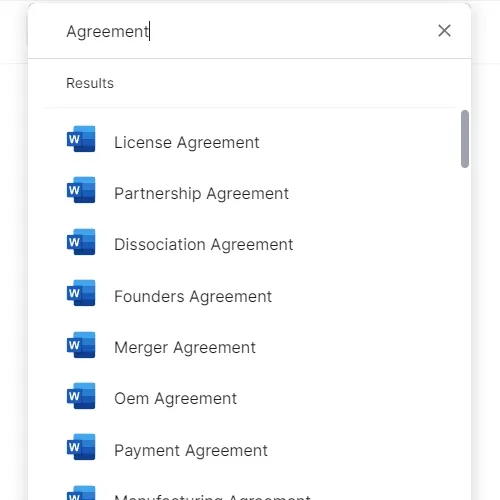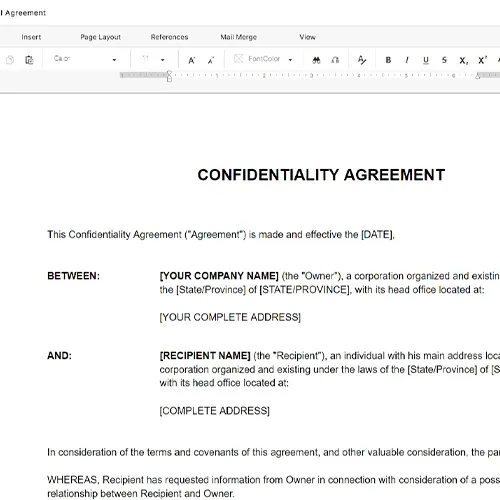How To Start An LLC

Document content
This how to start an llc template has 3 pages and is a MS Word file type listed under our business plan kit documents.
Sample of our how to start an llc template:
HOW TO START AN LLC A limited liability company (LLC) is a type of business structure that shields its owners from being held personally liable for its liabilities. One of the most important steps in starting a company is forming a limited liability organization. An LLC can provide liability protection for your company and other benefits. You must file documentation with your firm's state to form an LLC. The requirements and procedures for forming an LLC vary substantially by state. Here are a few general guidelines you need to follow to start a limited liability company in any state: Choose a name for your LLC Choosing a company name is the first and most crucial step in forming an LLC. Pick a name that complies with LLC naming regulations and is simple for prospective customers to find online. While these requirements vary, most states generally specify: The business name must contain the phrase "limited liability company" or one of its abbreviations (LLC). Any terms in the name that might be confused with those of a public authority are prohibited (e.g., FBI, State Department). Restricted words (like "bank" or "attorney") may require additional paperwork and the involvement of a licensed person, such as a lawyer, in the LLC. Most states don't permit the use of the same name by two distinct companies. In many states, you can check the availability of existing business names online to see if the name you've selected for your LLC is already taken. Before submitting LLC paperwork, you should always check the Secretary of State's website for name availability. You can reserve your LLC name for a brief term until you file your articles of organization and pay the fee. Choose a registered agent Nearly all states require that LLCs designate a registered agent, also known as a statutory agent. A registered agent is an individual or corporation who accepts court summonses, subpoenas, and other legal papers on the LLC's behalf. The registered agent then passes the legal documents to the appropriate person at the LLC. Any person who is a state resident and is older than 18 can act as a registered agent, including a member or LLC officer. Individuals may also choose a member of their LLC or a trusted friend to be their registered agent, as long as they meet the state requirements. Several businesses offer registered agent services for a price. File articles of organization
3,000+ Templates & Tools to Help You Start, Run & Grow Your Business

Document content
This how to start an llc template has 3 pages and is a MS Word file type listed under our business plan kit documents.
Sample of our how to start an llc template:
HOW TO START AN LLC A limited liability company (LLC) is a type of business structure that shields its owners from being held personally liable for its liabilities. One of the most important steps in starting a company is forming a limited liability organization. An LLC can provide liability protection for your company and other benefits. You must file documentation with your firm's state to form an LLC. The requirements and procedures for forming an LLC vary substantially by state. Here are a few general guidelines you need to follow to start a limited liability company in any state: Choose a name for your LLC Choosing a company name is the first and most crucial step in forming an LLC. Pick a name that complies with LLC naming regulations and is simple for prospective customers to find online. While these requirements vary, most states generally specify: The business name must contain the phrase "limited liability company" or one of its abbreviations (LLC). Any terms in the name that might be confused with those of a public authority are prohibited (e.g., FBI, State Department). Restricted words (like "bank" or "attorney") may require additional paperwork and the involvement of a licensed person, such as a lawyer, in the LLC. Most states don't permit the use of the same name by two distinct companies. In many states, you can check the availability of existing business names online to see if the name you've selected for your LLC is already taken. Before submitting LLC paperwork, you should always check the Secretary of State's website for name availability. You can reserve your LLC name for a brief term until you file your articles of organization and pay the fee. Choose a registered agent Nearly all states require that LLCs designate a registered agent, also known as a statutory agent. A registered agent is an individual or corporation who accepts court summonses, subpoenas, and other legal papers on the LLC's behalf. The registered agent then passes the legal documents to the appropriate person at the LLC. Any person who is a state resident and is older than 18 can act as a registered agent, including a member or LLC officer. Individuals may also choose a member of their LLC or a trusted friend to be their registered agent, as long as they meet the state requirements. Several businesses offer registered agent services for a price. File articles of organization
Easily Create Any Business Document You Need in Minutes.

Access over 3,000+ business and legal templates for any business task, project or initiative.

Customize your ready-made business document template and save it in the cloud.

Share your files and folders with your team. Create a space of seamless collaboration.
Templates and Tools to Manage Every Aspect of Your Business.
Business in a Box Covers Every Business Department
Includes 16 Types of Business Documents You Need
and Achieve Your Business Goals Faster.
